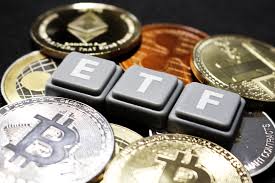Understand Bitcoin ETFs in One Article (1)

How does the Bitcoin ETF work?
1. ETFs that hold bitcoin assets
This is essentially the same type of ETF compared to the types of ETFs we've talked about.
The only difference is that authorized participating brokers can choose to issue a basket of currencies instead of Bitcoin. This is convenient for many authorized participating brokers who don't want to buy and hold bitcoin.
Then when an authorized participating broker sends a package of currencies, the ETF provider will use those currencies to trade Bitcoin. The provider would then return the equivalent value of the ETF shares to the authorized participating broker, and there would also be a lower trading rate.
The most recent ETF, issued by VanEck and SolidX, follows exactly this model.
Benefits: - Lower transaction rates - Trading ETFs is relatively cheap, especially with bitcoin and fiat currency. Expensive fees compared. - Tracking Bitcoin Performance - Since this ETF holds Bitcoin, it also tracks the performance of Bitcoin. Authorized participating brokers can arbitrage the price difference between the ETF and the net value, which will also prevent large discounts and premiums phenomenon. - Market Liquidity - Bitcoin is traded in billions of dollars a day. The risk to the market cashing out should not be great.
Risks and Concerns: - Counterparty Risk - ETF providers also hold bitcoin and must keep it safe. It will not be stolen. - Expense per share is high - most likely the first wave of ETFs will not be available to retail investors. To allay the SEC's concerns and go to protect retail investors, VanEck proposed a Bitcoin ETF price of 25 BTC. - Higher Spend Ratio - Bitcoin ETFs are likely to cost more than regular ETFs. Because if authorized participating brokers choose to apply through a basket of currencies to redeem an ETF, they will need to pay a higher Cost. Currently, VanEck intends to charge a $1,000 fee on any creation and redemption of ETF shares. - Uncertain NAV - Redemptions are based on the fund's NAV, so an unstable NAV can affect the arbitrage mechanism. The net worth of most ETFs is calculated daily. However, due to the volatility of the Bitcoin market, intraday netting is required. For example, the VanEck ETF intends to use the MVIS Bitcoin Index, which is updated every 15 seconds. However, determining net worth is still difficult because prices can vary from exchange to exchange. - Market is closed to ETFs, but open to Bitcoin - The market for trading ETFs can be closed, but the digital currency The exchange can be open. Also the price of bitcoin would fall dramatically and investors would not be able to get their losses back in a closed market. Non-instant trading hours can also increase the gap between the ETF price and the fund's NAV.
2. buy bitcoin derivatives in ETFs
The second ETF does not require any bitcoin holdings. These ETFs need to go to track the performance of bitcoin by trading bitcoin futures, options and other derivatives.
The Direxion ETF is one such case, and the VanEck Vectors Bitcoin ETF is another.
Benefits: - These funds don't need to worry about the security risks of holding bitcoin, as they don't actually hold any bitcoin.
Risks and Concerns: - Estimating Bitcoin Performance - As such funds can only estimate the performance of Bitcoin, it may happen that the returns of the fund will deviate significantly from the performance of real Bitcoin.
- Actively Manage Risk - For any actively managed fund, performance depends on the fund manager. If one tries to track the performance of Bitcoin, then the fund manager may not have as much to gain from Bitcoin.
- Actively Manage Costs - Actively managed funds will charge higher service fees than passive funds. This is also known as the overhead ratio.
- Margin Risk - Futures contracts require you to hold a certain amount of assets, this is known as margin. If the margin does not meet this requirement, then the exchange will require a margin call. If there is not enough cash or equivalents, then the futures contract will be closed out, resulting in a direct loss to the asset. Fluctuations in the market are likely to cause such events to occur. Even relatively small price fluctuations can lead to big losses. Imagine the volatility of Bitcoin, which can be a huge loss if not handled correctly. Worse, for futures exchanges, they will even manipulate prices to blow up their users.
- Leveraged trading risk - Leveraged trading means that even small price fluctuations can result in a significant impact on capital.
- Rollover Risk - Many futures contracts are converted into futures transactions during the course of a futures trade, which is known as a rollover. This allows futures contracts to expire so they can be settled. If the futures price of a contract is higher than the target price, then the investor will lose, which is known as the futures premium.



